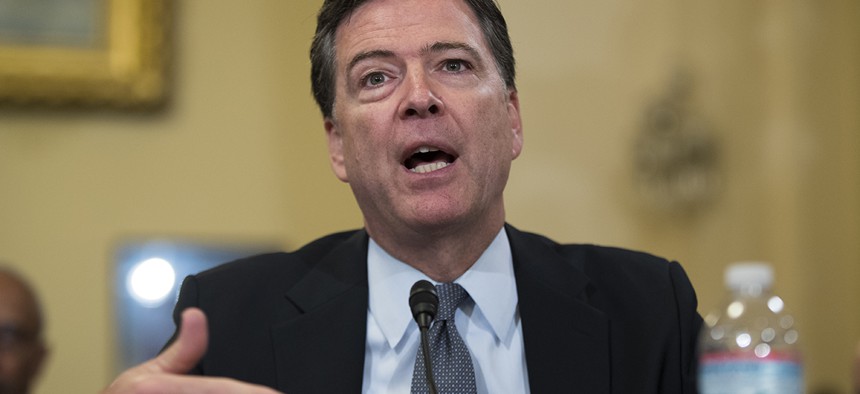Did FBI Director James Comey Violate the Hatch Act?

FBI Director James Comey testifies on Capitol Hill in Washington. Evan Vucci/AP File Photo
The Hatch Act bars any “activity directed at the success or failure of a political party“
Less than two weeks before the U.S. votes, the director of the Federal Bureau of Investigation, James Comey, announced “the FBI has learned of the existence of emails that appear to be pertinent to the investigation” into Hillary Clinton’s use of a private server. But with the clock ticking, the FBI has failed to divulge any pertinent information from the new emails, making its big announcement look deliberately unfair to the Clinton campaign.
On Oct. 30, Senate minority leader Harry Reid, who called himself a past supporter of Comey, suggested the FBI director may have broken a federal law with his announcement. In a letter to Comey Reid released to the public, the Democratic leader said Comey’s actions “violate the Hatch Act, which bars FBI officials from using their official authority to influence an election.”
So, what is the Hatch Act? The federal law, passed in 1939 after concerns about government employees being used to influence the outcome during the 1938 congressional elections, is designed to ensure all federal workers—from the Postal Service to the FBI—undertake their roles in a nonpartisan fashion. (The only people exempt are the president, the vice president and a handful of other high-level elected officials.)
The Hatch Act bars any “activity directed at the success or failure of a political party“—which is the part Reid is accusing the FBI director of violating. Comey’s actions also reportedly defied the wishes of attorney general Loretta Lynch and broke with traditional Justice Department practices.
The law does not require an employee’s actions actually affect election results—it is their intent that is scrutinized. Richard Painter, the White House’s chief ethics lawyer from 2005 to 2007 has filed a complaint against Comey with the Office of Special Counsel and the Office of Government Ethics, and he called Comey’s actions an “abuse of power.” “The FBI’s job is to investigate, not to influence the outcome of an election,” Painter wrote in an op-ed for The New York Times.
Reid also suggests in his letter to Comey the FBI has been deliberately sitting on “explosive information” regarding Donald Trump’s close ties with Russia, despite calls to release it to the American public.
“The double standard established by your actions is clear,” Reid wrote. “As soon as you came into possession of the slightest innuendo related to Secretary Clinton, your rushed to publicize it in the most negative light possible.”
The Hatch Act is an administrative directive, not a criminal offense, and violating it—if that is indeed what Comey did—carries no jail time or even mandatory firing. Of course, since Comey serves at the pleasure of the president, he can be removed at any time. His tenure is slated to continue until 2023.
On Oct. 30, the president’s office issued a statement saying Comey is “a man of integrity and is not trying to influence the U.S. presidential election by announcing scrutiny of additional emails linked to Democrat Hillary Clinton’s private server,” Reuters reported. White House spokesman Josh Earnest added he has no “independent knowledge” of what led Comey to publicly discuss the issue.
NEXT STORY: 9 Most Memorable Cyber Incidents of 2016


